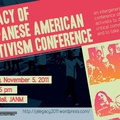Entertainment and media are meant to appeal to a wide audience and superficially anime are just that: they're cartoons. Some of them are ridiculously cheesy; some are so easily predictable it’s almost laughable. But oftentimes it is the whimsical and seemingly impractical things our imaginations whip up that reveal the subtle hints about a culture; and that satire brings to light facets of a culture that we tend to overlook. At first I brushed off these animations as just a show, but it's fascinating to see the deeper meanings that underlie the impossible action and the fantastical situations of these anime.
For me, it’s interesting to note how large a role anime and manga played in my initial attraction to the Japanese culture, subsequently leading to my comparison of it to Japanese American history. Watching shows like Sailor Moon as a young child, it was nostalgic to watch a show in Japanese, and I loved the way that the seiyuu (voice actors) could convey their emotions and expressions so well. So as I grew older I began to be drawn back to these Japanese animations. But since English was, and still is, the predominant language spoken at home, my Japanese skills were quite nonexistent.
During middle school I remember the Naruto series was all the rage (And it still is for the most part. Who can resist a show about ninjas?). For the people getting into this hype they were so excited to meet someone of Japanese descent. I would go through this constant repetition of "Oh my gosh! Do you speak Japanese!?" And every time I heard that question, without a second thought, my initial and immediate reaction was "No...why?" My parents, especially my mother, emphasized that I had to have a strong grasp of English, so they downplayed learning the Japanese language. In addition to this, I felt as though I didn't need to know Japanese because I rarely came in contact with Nikkei , especially Nikkei who speak Japanese. But then I weighed the significance of my response: my parents are not native speakers of English, especially my mother. The countless times our conversations came to an abrupt end because neither of us could really elaborate to the other our thoughts, suddenly became very apparent to me.
As I finished an episode of the Naruto show, the lingering feeling I had was my relief for the subtitles. Though in watching these shows I can depend upon another’s translation, in face-to-face conversations there can never be subtitles. And to have an interpreter for someone who is as close to you as your parents is, in my opinion, preposterous. Filled with remorse I took it upon myself to learn the language. Even though my vocabulary was limited I could still make out certain words or phrases, and one of the good things about anime is that the characters have a tendency to repeat lines throughout the series, even within each episode. Certain key words would catch my attention and they would eventually help to lay the foundations for my shaky skills. I began to take an interest in manga so that by looking at and understanding the hiragana and katakana I could associate the sounds I heard with actual characters. At that time Japanese sounded like a fast-paced language because I could not distinguish every word, and my comprehension would force me to only make out the next familiar term. Even though self-study is difficult I was too embarrassed to ask my parents for help. Number one, my dad refused to speak Japanese to me, perhaps because he was too used to talking to me in English. Number two, I tried saying something in Japanese to my mother and she gave me a blank stare, thinking I spoke English. I have to admit, back then my Japanese accent was quite atrocious.
As I struggled with Japanese never more had I held greater appreciation and admiration for those who take it upon themselves to learn a new language, especially for those who immerse themselves in a nation that speaks a completely foreign tongue. My first obstacle in learning the language was just trying to improve my accent to sound more like a native. Although my Spanish classes helped improve my pronunciation, I tried too hard to literally connect Japanese with English. It was while I was taking Spanish 1 that my teacher, Señora Gonzalez, helped me understand that grammar and rhetoric alone cannot properly express language, but it is the people, culture, food, songs, dances -- every aspect of a country that come to harmonize as one within the spoken and written word. Her words made me more aware of my second obstacle: language itself depends heavily on the connotations of a word and the context they are used in. It's like synonyms -- even if another word has the same denotation it can have a completely different meaning given the situation. Grasping onto this idea I tried harder to learn about the Japanese culture and tradition so that I could better understand the nuances and cultural references, and even some of the idioms and jokes in Japanese. Within four years I had a fairly good grasp of understanding Japanese, but I still lacked the ability to speak, read, and write at a proficient level.
In reviewing my fluency with Japanese, upon my entrance into college I took the Japanese language proficiency exam not only as a requirement for my major, but also to gauge my language skills. When I learned that I would be placed in the heritage learners’ class, I was plagued by mixed emotions: I was glad that I knew some level of Japanese, but apprehension unsettled me because I lacked grammatical skill and knew virtually no kanji. Yet when I approached Professor Kawanishi she said my skills were too high to be placed in non-heritage speakers’ series, and I could quickly adapt to the class demands. But practically all the students in my class were Nisei who took Japanese school, skillfully used the language at home, or were Issei. As I struggled to form a grammatically correct sentence everyone spoke eloquently and wrote with great finesse. My self-study was greatly lacking compared to the intensity I was exposed to at UCLA. Here, it felt like I was immersed into a Japanese classroom. The pressure rose as those who were bilingual wanted the course to be even more challenging. As everyone spoke of visits to Japan familiarly and how they practiced so many more orthodox Japanese traditions, I felt left out. Although it had felt as though my parents were being very Japanese I realized just how much they had adapted to a more American lifestyle separate from their childhood upbringing.
This difference became more apparent when we received an early reading assignment for my Japanese 102A course. It was during this freshman year of my first Japanese language class with Professor Kawanishi that I was first exposed to the Discover Nikkei website. We read Keiko Fukuda’s review of Fujiko Kataoka’s book アメリカで育つ子供たち (America de sodatsu kodomotachi ) about Nikkei children being brought up in America. Kataoka-sensei feels it is essential to teach children to be bilingual, so they will have strong ties to their heritage. However, according to Kataoka-sensei , many of the schools that teach Japanese in America fail to teach the language in its entirety because of the brevity of its approach to the culture. Her book questions how these children will identify themselves as “Americans” and/or as “Nikkei.” With this article and my experience in this class, I began to really think of what is to be Nikkei, or rather, what does it mean to be Nisei.
Although I am a Shin-Nisei (the child of a Japanese immigrant who arrived after WWII) I felt very detached from the other students in my class, who readily related to many of the Japanese traditions and mannerisms. At times I have gotten reactions praising me for learning on my own, from others I have received admonished looks that I learned not from my parents, but from the popular media; it was as though I jumped the Japanophilia bandwagon. I wish I could say I’m bilingual, but I am far from it. Plus, I think I will always have difficulty with being able to convey my thoughts as a heritage speaker. I was so surprised when we had mock interviews with recruiters from a Japanese company that there is a specific message relayed by the number of times you knock (e.g. three knocks is rude because it relays the message “ha-ya-ku,” or “Hurry up!”) and when you speak to a customer on the phone it’s rude to ask for a name so you must wait for them to provide their name for you. At this point I really felt as though I could probably never fully be Japanese because the way I think and perceive ideas are very American.
This classroom was far from actually living and experiencing the lifestyle in Japan, but I had a more realistic approach about the Japanese language and culture in this setting as opposed to the one popularized in the media. I think I tried too hard to try to be something I wasn’t, because I didn’t understand what Japanese-American is. I still don’t. But at the same time I’m grateful for it. If I were forced to learn the language and spend hours in lectures against my will to learn about traditions I probably wouldn’t care as much about my heritage.
At least now I can have more fruitful conversations with my mother. Although it’s funny how we thought along the same lines – as I fought to learn Japanese my mother would do her best to speak English. But somewhere along the way we were able to have a nice conversation in Japanese, and she began to be more open about her childhood. At least now we can watch dramas together and laugh at the corny humor or poke fun at the characters. I don’t have to ask her every few minutes what something means. Well, for the most part.
© 2009 Yoshimi Kawashima





